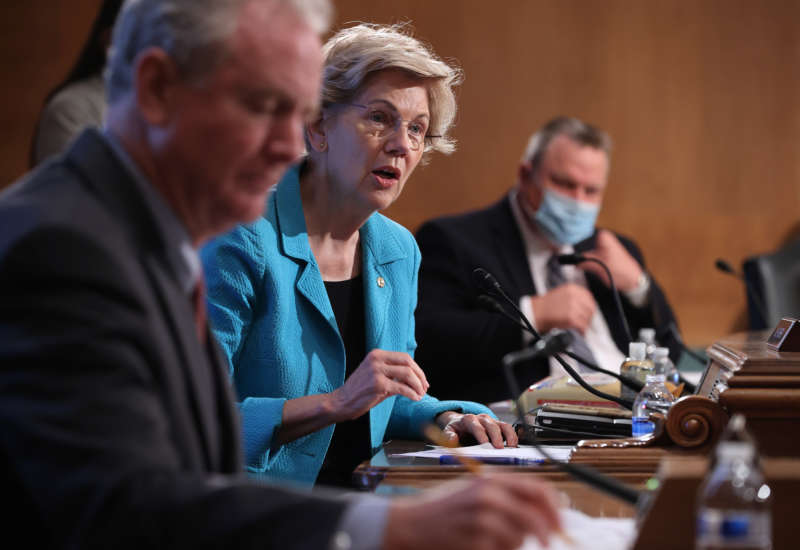After it was revealed that top Federal Reserve officials had made several large stock trades, Sen. Elizabeth Warren (D-Massachusetts) has called for regional Fed banks to stop allowing Fed officials to trade stocks altogether.
On Wednesday, Warren sent letters to 12 regional Fed presidents urging them to amend their ethics rules to bar themselves and their staff from trading stocks, calling it a matter of reinforcing public confidence in the agency.
“Regional Fed leaders must ban the ownership and trading of individual stocks by senior officials, and impose strong and enforceable ethics and financial conflicts of interest rules for themselves and their staff to restore public trust,” Warren said. “Instating critical ethics rules will send a clear and necessary message to the American people about the importance of government ethics and the integrity of Fed officials.”
The Fed announced Thursday that after outcry over recent Fed officials’ stock trades, the agency is now looking into changing its rules regarding stock trading per the direction of Fed Chair Jerome Powell.
“Because the trust of the American people is essential for the Federal Reserve to effectively carry out our important mission, Chair Powell late last week directed board staff to take a fresh and comprehensive look at the ethics rules around permissible financial holdings and activities by senior Fed officials,” a spokesperson for the Federal Reserve said. “This review will assist in identifying ways to further tighten those rules and standards.”
It was recently revealed that Dallas Fed President Robert S. Kaplan and Boston Fed President Eric Rosengren both bought and sold significant amounts of stocks and real estate-related assets last year as the global economy was being rocked by the pandemic. Rosengren had stakes in four real estate trusts.
Kaplan, meanwhile, had made nearly two dozen stock trades of $1 million or more, including in companies like Johnson and Johnson and oil and gas companies that were directly involved in or affected by the COVID-19 pandemic. Many of his oil and gas transactions were made at a time when the role of the industry was being questioned within the finance world.
These trades appear to be legal, and were made outside of the window that would qualify them as insider trading. But even if they weren’t strictly illegal, the Fed still has wide sway over the stock market at large — and the trades raise questions about whether or not such officials should be allowed to trade stocks at all, considering they hold such positions of power and possess a wealth of insider knowledge.
Kaplan and Rosengren have both pledged to sell their individual stock holdings by the end of this month. But Warren said that the practice should be banned altogether for people in positions of vast political power, asserting in her letters that “the American public should not have to rely on vague and unenforceable promises made amidst an ethics firestorm in order to have confidence that Fed officials are acting solely in the public interest, not based on their own financial interests.”
“The controversy over asset trading by high-level Fed personnel highlights why it is necessary to ban ownership and trading of individual stocks by senior officials who are supposed to serve the public interest,” Warren continued. She asked the leaders of the Fed branches to impose a ban on stock trading within 60 days and send her a written plan to do so by mid-October.
The Massachusetts lawmaker has been pushing for tighter rules around stock trades for politicians and federal officials overall. Earlier this year, she unveiled legislation that would bar members of Congress, the president, cabinet officials, judicial leaders, and anyone in a position of influencing financial regulation from trading stocks. The bill, she said, would fight corruption and increase public trust in Washington.


